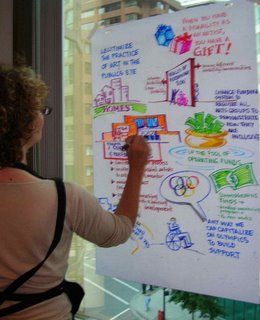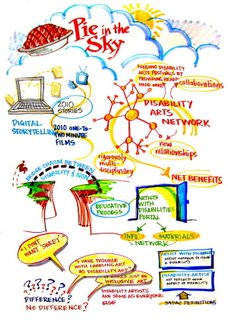skip to main |
skip to sidebar
If you're new to the idea of graphic recording, you might wonder what the point of it is. Sure, it looks pretty and colourful – but is there really anything to be gained by recording information and ideas this way, rather than just jotting notes down in bulleted lists on a good old flip chart?
Well, yes, actually, there is.
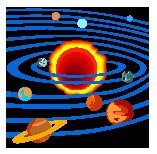
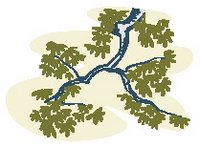 For one thing, in graphic recording, information is organized differently. Instead of the standard list format, which sets up the appearance of linear relationships between ideas, this process organizes ideas in a more organic way. Which is how ideas relate to each other in real life, if you think about it. Far from lining up one, two, three, four, they arrive in clouds…or branch out from each other…or veer off on tangents…or orbit around each other…and so on. With graphic recording, all this is depicted on the page, so you get a more accurate representation of how ideas actually relate to each other than you'd get from
For one thing, in graphic recording, information is organized differently. Instead of the standard list format, which sets up the appearance of linear relationships between ideas, this process organizes ideas in a more organic way. Which is how ideas relate to each other in real life, if you think about it. Far from lining up one, two, three, four, they arrive in clouds…or branch out from each other…or veer off on tangents…or orbit around each other…and so on. With graphic recording, all this is depicted on the page, so you get a more accurate representation of how ideas actually relate to each other than you'd get from- the usual
- bulleted
- list
- (yawn)
...and you can SEE those relationships on the page. It also seems to more closely resemble how people actually think; one person, seeing this process for the first time, said: "Your drawing looks like how the thoughts look in my head!" I thought that was pretty cool.
Then, of course, there's the old saw about one picture being worth a thousand words. Now, I happen to be just as verbal as I am visual (as anyone who knows me will attest!), but it's really true that you can often capture in a single image something that would take a couple of pages to describe in writing. And there's nothing to stop you from combining images from a graphic recording session with a "wordy" report of the proceedings, like a book with illustrations. Double your pleasure, double your fun, I say. 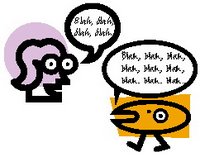
Another thing about graphic recording is that the visuals help people remember details of a meeting much better than a written report alone can do. And certainly better than those cryptic flip chart notes that are often almost unintelligible later…
And last but not least, graphic recording is dynamic, energizing and fun! Not just for the person doing it, but for everyone present. I've found that creating a real-time visual representation of people's ideas generates a level of involvement and interaction that I haven't seen in other settings, and unleashes people's own creativity and imagination. Plus it seems to loosen folks up and put them in a good mood. Because, along with everything else, graphic recording is pretty darn entertaining.
OK, disclaimer time. Not everyone twigs to this stuff. Some people just think better in words and think pictures, like Trix, are for kids. That's OK too. There is really no one method or process that works equally well for everyone. But sticking to just one way of capturing info and ideas is like living in black & white when you could have access to a full range of colour. The more senses you can engage, the richer your experience of the world - and the more likely you are to retain, enjoy, and learn from that experience.
That's how I see it, anyway. And I guess I would, eh - otherwise I wouldn't be doing this work!
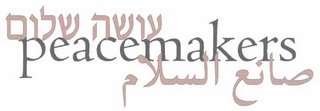 I know that in the wide world of blogdom we're supposed to post often to keep our avid readers up to date on what we're thinking and/or doing. It's hard for me to imagine that the world is waiting with bated breath for my latest pronouncements, especially since I'm not really using this blog to pronounce on anything – it's mainly meant as a public portfolio of my work in graphic recording and facilitation. So when I haven't done any new work, I haven't got anything new to post.
I know that in the wide world of blogdom we're supposed to post often to keep our avid readers up to date on what we're thinking and/or doing. It's hard for me to imagine that the world is waiting with bated breath for my latest pronouncements, especially since I'm not really using this blog to pronounce on anything – it's mainly meant as a public portfolio of my work in graphic recording and facilitation. So when I haven't done any new work, I haven't got anything new to post.
But just so you know I haven't simply been slacking off, I will let you know what else I've been up to in the past couple of weeks. As you can probably tell from the links in the sidebar, I have a big interest in dialogue. And I have a particular interest in dialogue around difficult issues, like the Israeli-Palestinian conflict. I am avid to learn about ways that we can use dialogue to achieve mutual understanding, respect and trust – and ultimately to find ways we can work together to resolve our differences. That doesn't mean we will necessarily come to see things the same way! But I believe that dialogue allows us to learn from and accept our differences, and to find the common ground on which we can build. And I believe that peace depends, among other things, on entering into dialogue with those with whom we disagree, and finding new ways to engage with – and appreciate! – each other.
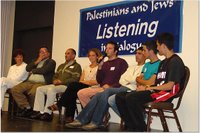
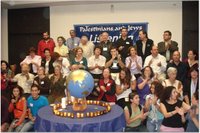 So I was delighted to be invited to attend the Oseh Shalom~Sanea al-Salam Peacemakers Camp in California at the beginning of September. Its organizers are Len and Libby Traubman, who have been pioneers in Jewish-Palestinian dialogue and who have led the way for many others to follow. The camp ran for 3.5 days, followed by a public presentation in San Francisco the following evening. It was an electrifying and inspiring experience that would take me hours to describe here. Suffice to say that it taught me new lessons in dialogue, introduced me to many new friends, and cemented my commitment to work for peace between our two peoples. If you're interested in reading more about the camp, you can find several articles on the camp website. They've added some photos from the presentation, and you can also see the lovely graphic recording done by Nancy Margulies, whom I wrote about in an earlier post, and her equally talented daughter, Mariah Howard.
So I was delighted to be invited to attend the Oseh Shalom~Sanea al-Salam Peacemakers Camp in California at the beginning of September. Its organizers are Len and Libby Traubman, who have been pioneers in Jewish-Palestinian dialogue and who have led the way for many others to follow. The camp ran for 3.5 days, followed by a public presentation in San Francisco the following evening. It was an electrifying and inspiring experience that would take me hours to describe here. Suffice to say that it taught me new lessons in dialogue, introduced me to many new friends, and cemented my commitment to work for peace between our two peoples. If you're interested in reading more about the camp, you can find several articles on the camp website. They've added some photos from the presentation, and you can also see the lovely graphic recording done by Nancy Margulies, whom I wrote about in an earlier post, and her equally talented daughter, Mariah Howard.
So that's what I've been busy with, and it's occupied my mind a lot. But today I did another graphic gig, and as soon as I get pix I'll post the best ones. I think I'm getting a bit better each time! Oh yeah: yesterday I bought a digital camera, so I'll be able to take my own pictures instead of depending on the kindness of strangers! Now all I have to do is figure out how to use it....

 For one thing, in graphic recording, information is organized differently. Instead of the standard list format, which sets up the appearance of linear relationships between ideas, this process organizes ideas in a more organic way. Which is how ideas relate to each other in real life, if you think about it. Far from lining up one, two, three, four, they arrive in clouds…or branch out from each other…or veer off on tangents…or orbit around each other…and so on. With graphic recording, all this is depicted on the page, so you get a more accurate representation of how ideas actually relate to each other than you'd get from
For one thing, in graphic recording, information is organized differently. Instead of the standard list format, which sets up the appearance of linear relationships between ideas, this process organizes ideas in a more organic way. Which is how ideas relate to each other in real life, if you think about it. Far from lining up one, two, three, four, they arrive in clouds…or branch out from each other…or veer off on tangents…or orbit around each other…and so on. With graphic recording, all this is depicted on the page, so you get a more accurate representation of how ideas actually relate to each other than you'd get from
